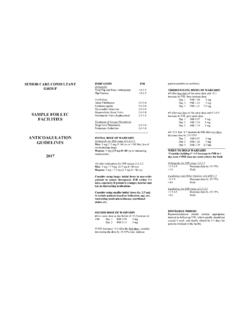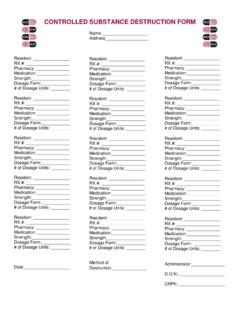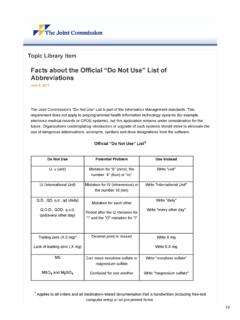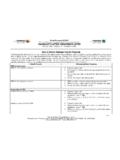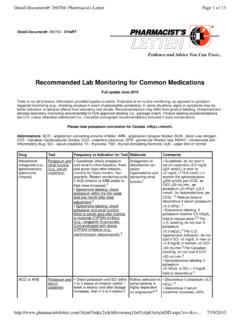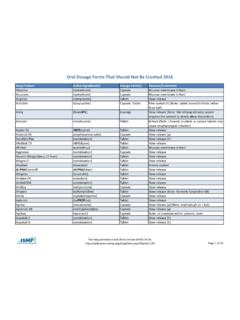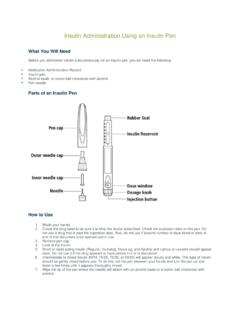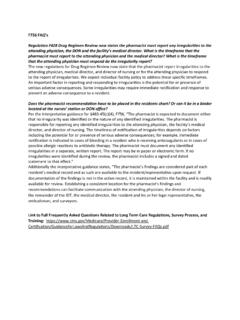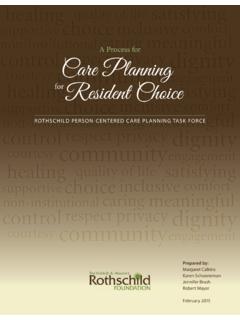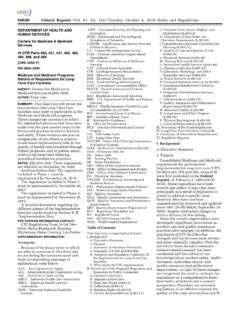Transcription of F758 - mysccg.com
1 F758 (Rev. 173, Issued: 11-22-17, Effective: 11-28-17, Implementation: 11-28-17) (c)(3) A psychotropic drug is any drug that affects brain activities associated with mental processes and behavior. These drugs include, but are not limited to, drugs in the following categories: (i) Anti-psychotic; (ii) Anti-depressant; (iii) Anti-anxiety; and (iv) Hypnotic Gradual Dose Reduction for Psychotropic Medications The time frames and duration of attempts to taper any medication must be consistent with accepted standards of practice and depend on factors including the coexisting medication regimen, the underlying causes of symptoms, individual risk factors, and pharmacologic characteristics of the medications.
2 Some medications ( , antidepressants, sedative/hypnotics, opioids) require more gradual tapering so as to minimize or prevent withdrawal symptoms or other adverse consequences. Close monitoring while medications are tapered will enable facility staff to determine whether a resident is experiencing side effects, changes in behavior, or withdrawal symptoms that originally prompted prescribing of the drug. However, some residents with specific, enduring, progressive, or terminal conditions such as chronic depression, Parkinson s disease psychosis, or recurrent seizures may need specific types of psychotropic medications or other medications which affect brain activity indefinitely.
3 NOTE: If the resident s condition has not responded to treatment or has declined despite treatment, it is important to evaluate both the medication and the dose to determine whether the medication should be discontinued or the dosing should be altered, whether or not the facility has implemented GDR as required, or tapering. The regulation addressing the use of psychotropic medications identifies the process of tapering as a GDR and requires a GDR, unless clinically contraindicated. Within the first year in which a resident is admitted on a psychotropic medication or after the prescribing practitioner has initiated a psychotropic medication, the facility must attempt a GDR in two separate quarters (with at least one month between the attempts), unless clinically contraindicated.
4 After the first year, a GDR must be attempted annually, unless clinically contraindicated. Link to Full Frequently Asked Questions Related to Long Term Care Regulations, Survey Process, and Training: F758 FAQ s Regulation F758 Unnecessary Drugs talks about requirements for psychotropic medications that are PRN and GDRs for these medications. Will Compazine (which is an antipsychotic according to some medication resources) which residents take for nausea and vomiting on a PRN basis expire every 14 days and have to be renewed every 14 days? Compazine or prochlorperazine is considered an anti-psychotic, though it can be used to treat nausea and vomiting.
5 Therefore, according to Federal requirements, a PRN order for Compazine would be limited to 14 days. A new PRN order cannot be renewed unless the attending physician or prescribing practitioner first evaluates the resident to determine if entering a new order for the PRN medication is appropriate. PRN Anti-psychotic medications (specifically Haloperidol) have become a routine order by Hospice physicians. I see no exception to this type of order in the requirements of participation or supporting materials in Appendix PP. The Hospice PRN order may go unused for a period of 14 days, necessitating an in-person reevaluation by the physician, despite the desire of the physician to have the medication available to assist with potential symptoms of dying, particularly delirium associated with hyperactivity at the end of life or for its potent antiemetic properties.
6 Good hospice care, honoring resident s choices and person-centered care, and Hospice clinical best practices all seem to be in conflict with the 14 day limit of PRN orders for anti-psychotic medications for persons receiving Hospice services. Is there an opportunity, if the medical record indicates the PRN order for Haloperidol is being used to manage end-of -life symptoms for a patient on Hospice care, for an exception to this requirement? These issues were all raised during the comment period, with little to no response. We understand your concerns and appreciate the importance of promptly addressing the needs of all residents, especially those residents who receive end of life or hospice care.
7 There is no exception to the PRN antipsychotic requirement in the regulations. The intent of this requirement is to address the concern that use of an antipsychotic medication, on a PRN basis beyond 14 days without physician evaluation of the resident , could be detrimental to the resident . We are aware that the current Medicare Hospice requirements under 42 CFR require updating of the comprehensive assessment every 15 days or more frequently as needed. Is melatonin considered a hypnotic to be reduced every ninety days? Melatonin does not fall under the requirements for psychotropic medications.
8 Melatonin is a natural hormone that is classified as a dietary supplement by the Food and Drug Administration and, therefore, is not subject to the requirements of hypnotics under the new psychotropic medication category at (c)(3). However, residents should still be monitored with regard to benefits, risks, and potential adverse consequences. The regulations state that PRN orders for psychotropic drugs are limited to 14 days except if the attending physician or prescribing practitioner believes that it is appropriate for the PRN order to be extended beyond 14 days, he or she should document their rationale in the resident s medical record and indicate the duration for the PRN order.
9 Say a resident takes Restoril (PRN for sleep), would it be acceptable for the physician to document a rationale that indicates the duration for the PRN order to be indefinite? Or is there a max on the duration of time for the PRN order? There is no maximum duration for PRN orders for psychotropic medications. However, if an attending physician or prescribing practitioner believes it is appropriate to extend a PRN order for a psychotropic medication beyond 14 days, he or she may extend the duration and document the rationale for extending the duration. This requirement was written to address concerns about residents remaining on PRN psychotropic for prolonged periods which may not be appropriate.
10 Indefinitely means for an unlimited or unspecified period of time so extending a PRN order indefinitely would not meet the intent of this regulation. It is also unlikely that a rationale could be provided to support an indefinite extension of a PRN order for a psychotropic medication. Does a resident with a diagnosis of schizophrenia with an order for Seroquel (an on label use) require a 14 day PRN order and continuous 14 day reassessment and PRN order indefinitely? There are no exceptions to the PRN antipsychotic medication requirements. Use of these medications, on a PRN basis, is limited to 14 days.
